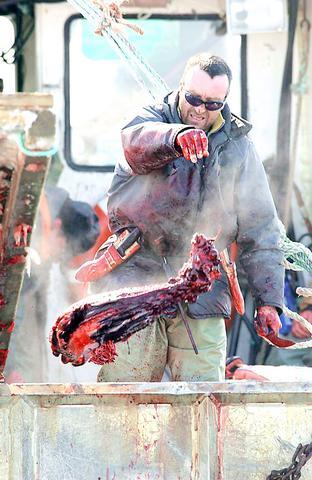Some 12,000 sealers armed with rifles and spears launched for the ice floes and islands off eastern Canada on Monday in the world's largest seal hunt, accompanied by protesters condemning the US$20 million harvest as barbaric.
Hunters are allowed to kill 350,000 young seals this year, the largest number since the government instituted quotas in the 1960s. The harp seal population is burgeoning at 5.2 million and pelts are garnering record prices of about US$50 each.
"I believe this hunt is inherently cruel and the regulations to protect the seals are woefully inadequate," said Rebecca Aldworth of the International Fund for Animal Welfare, which will monitor the cull.

PHOTO: AFP
The hunt off the coasts of Newfoundland and Labrador received international attention beginning in the 1960s, and bloody television images of baby harp seals being clubbed to death led to bans on white seal fur and boycotts of Canadian fish products in many European markets.
Since then, the Canadian government has tried to ease protesters' concerns by banning the killing of seal pups under 12 days old -- when their fur changes from white to gray -- and implementing regulations designed to make the hunt more humane.
Many countries, including the US, still ban imports of seal products, but Ottawa has supported the hunt to help Canada's economically suffering coastal towns. The industry earned about US$15 million last year, primarily from pelt sales to Norway, Denmark and China.
Earlier this year, the Humane Society of the US took out full-page newspaper ads urging Americans to cancel trips to Canada and boycott Canadian products.
US Senator Carl Levin introduced a resolution condemning the hunt, and some of those attending the Sundance Film Festival in Utah earlier this year wore T-shirts reading: "Club Sandwiches, Not Seals."
However, some of the major activist groups that targeted sealing in the past said they have more pressing issues to address this year.
Andrew Male of Greenpeace Canada said the organization was "not actively campaigning" against the hunt, instead focusing on such issues as genetically modified foods and climate change.
Despite its newspaper ad, the Humane Society does not oppose the hunt itself, only some of the methods used by sealers, spokesman Nicholas Braden said.
Although most seals are shot instead of clubbed, many wounded animals are left to drown, he said. Also, an organization study found that 40 percent of the seals killed were still alive while being skinned, despite rules designed to prevent this, he said.
Steve Outhouse, a spokesman for Canada's Ministry of Fisheries and Oceans, disputed those accusations. A Canadian Veterinary Medical Association study found that 98 percent of the seals were killed "in a medically humane manner with the minimum of pain," he said on Monday.

PRECARIOUS RELATIONS: Commentators in Saudi Arabia accuse the UAE of growing too bold, backing forces at odds with Saudi interests in various conflicts A Saudi Arabian media campaign targeting the United Arab Emirates (UAE) has deepened the Gulf’s worst row in years, stoking fears of a damaging fall-out in the financial heart of the Middle East. Fiery accusations of rights abuses and betrayal have circulated for weeks in state-run and social media after a brief conflict in Yemen, where Saudi airstrikes quelled an offensive by UAE-backed separatists. The United Arab Emirates is “investing in chaos and supporting secessionists” from Libya to Yemen and the Horn of Africa, Saudi Arabia’s al-Ekhbariya TV charged in a report this week. Such invective has been unheard of

US President Donald Trump on Saturday warned Canada that if it concludes a trade deal with China, he would impose a 100 percent tariff on all goods coming over the border. Relations between the US and its northern neighbor have been rocky since Trump returned to the White House a year ago, with spats over trade and Canadian Prime Minister Mark Carney decrying a “rupture” in the US-led global order. During a visit to Beijing earlier this month, Carney hailed a “new strategic partnership” with China that resulted in a “preliminary, but landmark trade agreement” to reduce tariffs — but

SCAM CLAMPDOWN: About 130 South Korean scam suspects have been sent home since October last year, and 60 more are still waiting for repatriation Dozens of South Koreans allegedly involved in online scams in Cambodia were yesterday returned to South Korea to face investigations in what was the largest group repatriation of Korean criminal suspects from abroad. The 73 South Korean suspects allegedly scammed fellow Koreans out of 48.6 billion won (US$33 million), South Korea said. Upon arrival in South Korea’s Incheon International Airport aboard a chartered plane, the suspects — 65 men and eight women — were sent to police stations. Local TV footage showed the suspects, in handcuffs and wearing masks, being escorted by police officers and boarding buses. They were among about 260 South

Chinese President Xi Jinping’s (習近平) purge of his most senior general is driven by his effort to both secure “total control” of his military and root out corruption, US Ambassador to China David Perdue said told Bloomberg Television yesterday. The probe into Zhang Youxia (張又俠), Xi’s second-in-command, announced over the weekend, is a “major development,” Perdue said, citing the family connections the vice chair of China’s apex military commission has with Xi. Chinese authorities said Zhang was being investigated for suspected serious discipline and law violations, without disclosing further details. “I take him at his word that there’s a corruption effort under